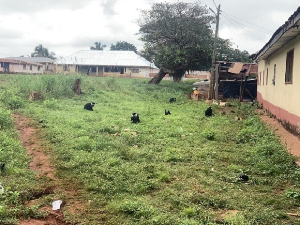How you can protect your bank account from fraudsters according to Cyber-security experts

Complains of pipo wey dey lose money to fraudsters na wetin dey happun evritime for Nigeria.
E dey also happun well-well for different parts of di world and di pipo wey dey do dis tin na internet fraudsters, wey many pipo sabi as 419 or mago-mago pipo.
But e be like say pipo no deyn too fall mugu for dem again sake of say di rate of how di mago-mago pipo dey use defraud citizens don reduce small.
Inside one report wey di Financial Institutions Training Centre (FITC) bring, Bank customers loss N472 million Nigerian Naira to 419 pipo in three months.
Dis three months, na di first quarter of 2023 wey cover from January to March.
Wetin dey inside di FITC Report
Di Financial Institute of Training Centre wey dem establish for 1981 as a non profit and special purpose professional services organization say a total of 12,553 cases of fraud na im dem record within dis period.
Di organization wey dey limited by guarantee of im members, wey also be members of Nigerian Bankers’ Committee, wey include di Central Bank of Nigeria, di Nigeria Deposit Insurance Corporation, and all licensed Banks and Discount Houses in Nigeria also give a breakdown of di mago-mago wey fraudsters do to tiff pipo money.
Di report show say di amount of money wey pipo lost thru mago-mago bank activities from January to March 2023 reduce wen dem compare am to di fourth quarter of 2022.
FITC say a total of N3.18 billion naira na im fraudsters tiff across banking platforms for di fourth quarter of 2022.
Di total number of fraud cases wey pipo report for di first quater of 2023 also reduce by 14.07 per cent.
Di report also show say a total of 12,553 cases na im dem report compared to di 14,609 cases last quarter.
Dem also note say na thru mobile phone, computer and web, Point of Sales (PoS) dem use do di magomago well -well. Dis na di regular trend dem use even for di last quarter of 2022.
“For Q1 2023 under review, di analysis of di magnitude-based ranking of fraud categories show say mobile fraud get di highest ranking wey accounts for N1.1bn (42.72 per cent), and dis dey followed by di computer/web fraud category wey get N646m (24.99 per cent).
Di next na PoS fraud wey get N450m (17.41 per cent) and fraudulent withdrawals wey be N139m (5.36 per cent).”
From di total amount wey pipo loss between January and March 2023, di data show say mobile fraud get 34.07 per cent at N161m.
Computer/web fraud accounting for 27.69 per cent with N130m and fraudulent withdrawals get 24.72 per cent at N116m.
Dis mean say di money wey pipo loss reduce by 85.13 per cent for di first quarter of 2023.
Wetin to look out for and protect your account from mago-mago pipo
Di Central Bank of Nigeria wey be Nigeria highest bank and oda commercial banks don continue to warn pipo about fraudsters.
For one disclaimer wey dem post for dia website wey di Head of Corporate Affairs sign, dem post di popular ways wey scammers dey use play pipo wayo.
“We receive several emails and oda correspondences wey concern Advance Fee Fraud also known as 419 on a daily basis.
419 na menace to di CBN. Na mago-mago pipo dey do scam to defraud pipo wey get big eyes for money”
Dem go further to tell pipo wetin dey regular scammers dey do.
Most times dem go contact you with unsolicited bulk mail, spam email, but dem go start to dey call you for phone as soon as you give dem your details.
Dem go claim say dem get plenti money wey dem keep inside one Nigerian or African account, but oda tins like – Inheritance, Wills, Next of kin, Contract claims and recently, Lotteries don join.
Most times dem go need pesin wey go help dem transfer am out of di kontri with a view to sharing some of di money with dem.
Dem go assure you say no risk dey for di deal and encourage you to send dem your personal details.
Dem go send you fake paper work to support wetin dem dey claim.
Most time dem dey include Identity cards, passports, faxes, memos, approvals, funds release certificates, fake cheques, fake Nigeria National Petroleum Corporation (NNPC) letter of contract award, agreements, fake CBN letter head, fake NNPC and CBN official stamps, etc.
Dem dey use yahoo.com (and other free email providers) e-mail address as a medium of communication.
Dem dey copy Central Bank of Nigeria domain email accounts and oda Financial Institutions to misled ATM users.
Some organized scammers get fake Central Bank of Nigeria website wia dem dey post fake documents to support dia claims.
Di method dem like well-well na transfer by Money Gram and Western Union Money Transfer.
Dem no dey ever use secure platforms like – Swift Code.
Tips to protect your bank account
Sake of di rate of dis fraudsters wey dey tiff pipo money from dia bank accounts, BBC Pidgin follow Bankole Adekola wey be Cyber expert tok.
Im give pipo some tips on how to protect dia bank accounts from fraudsters, di tips include:
– Dey careful about di information you share online. No give out your personal information or debit (ATM) card details, unless you sure say di website na original and e dey legit.
– Monitor your accounts: Try to check your bank account evritime, check your bank statements and transaction history regularly to identify any activity wey you no approve. If you notice any suspicious transactions, report dem to your bank immediately.
– Use strong password and make you dey change di password evritime. A strong password suppose dey at least 12 characters long.
– Make di password include a mix of upper and lower case (capital and small ) letters. Im advise make pipo dey use sentences instead.
– Dey careful about di links wey you dey click for emails or text messages. If you no dey sure say di link dey genuine, check am well to see di actual Uniform Resource Locator (URL) before you click.
– No share your account information with anybody, even though dem be your friends or family.
– Dey careful about di information you post on social media. Fraudsters fit use dis information to target you.
– Enable two-factor authentication (2FA): Wenever e dey possible, enable 2FA for your bank account. Dis dey add extra layer of security by requiring a second form of verification, like unique wey dem go send to your mobile device, in addition to your password.
– Dey careful with personal information: Stay away from unsolicited communications wey dey ask for your personal/financial information, One True Pair (OTP), or any code whatsoever.
– Banks no go ever ask you to provide sensitive details thru email or over di phone.
– If you no dey sure, contact di organization directly thru dia official website or customer service line.
Source: BBC





